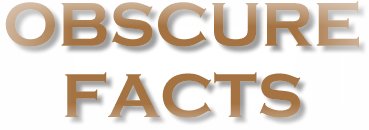John Dennis (1657-1734), for his new play "Appius and Virginia" had invented a new means of creating theatrical thunder. His play was a dismal failure. A few nights later, Dennis was attending a performance of Shakespeare's "Macbeth" and heard his own thunder being used. He stood, swore, and shouted "See how the rascals use me! They will not let my play run, and yet they steal my thunder!"--Biographia Britannica, vol. v. p. 103.
King James of England, under whose auspices the influential King James version of the Bible was translated into English, was a rabid hater of witches. He insisted that the phrase be added.
Coins minted in Joachimstal in the seventeenth century were of such purity and craftsmanship that they were highly prized across Europe. They became known as "joachimstalers", which was eventually shortened to "taler", and then to "dollar."
When, in 1809, Ohio legislators were preparing to sign the documents of incorporation, there was a fire in the statehouse. By the time the confusion was settled, it was forgotten that the documents were never signed. Although several U.S. presidents were born there, and although the state seal proudly proclaims its incorporation date as 1809, the state of Ohio was officially admitted into the union in 1953. This page copyrighted 1998 by Scott Nolan |

 The phrase "to steal
someone's thunder" was first spoken by a man whose
thunder had literally been stolen:
The phrase "to steal
someone's thunder" was first spoken by a man whose
thunder had literally been stolen: